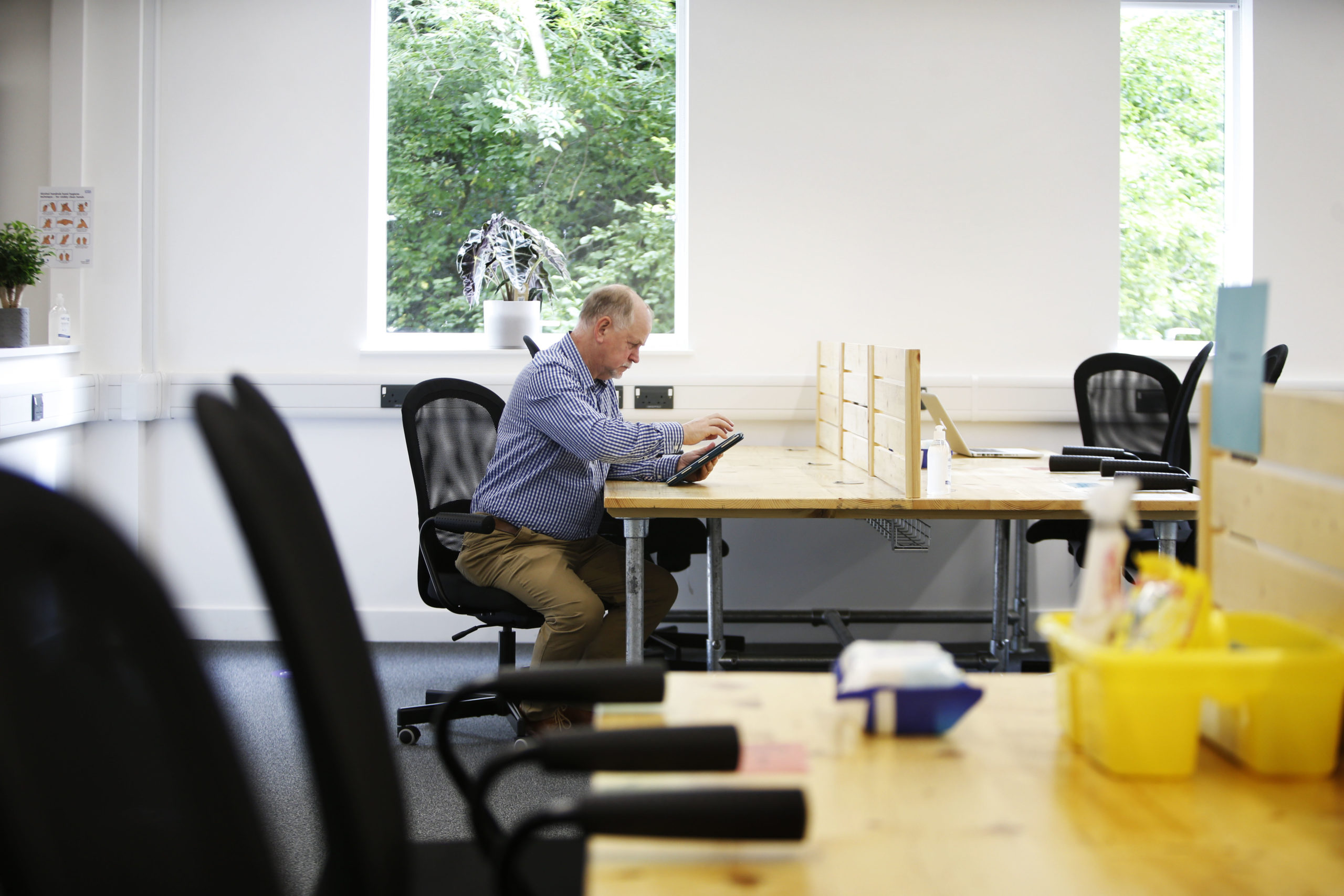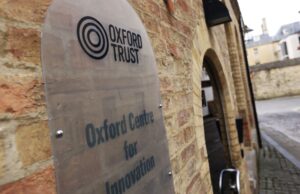Flexible certainty – the future of science and tech workspace?
September 23, 2020

Reassessment of the working environment
One of the most notable things to emerge from the COVID-19 situation is a reassessment by companies of what is important to them and their employees.
It has highlighted that enhanced flexibility and shaping the workplace is likely to be the key to survival – especially at the early stages of company development.
Attitudes and expectations of employees are also changing with many getting used to working from home, adopting systems such as Zoom and MS Teams, and just as many wanting to get out of the home craving more social contact.
As owners of two innovation centres in Oxford, it is simply no longer just about providing a desk, maximising employee density and offering breakout spaces, but about enhancing the experience to create places employees want to come to, not have to go to.
Unique enriched office and lab environments, with health and wellbeing in mind, will be an important part of the decision-making process in attracting and retaining future talent, as well as supporting informal meetings, social events that encourage wider collaboration and, hopefully, spark greater innovation in the ecosystem.
The Trust’s new centre, The Wood Centre for Innovation in the heart of Oxford’s booming Global Health & Life Sciences District, was designed with all these facets in mind.
Our air source heat pumps for heating, and the natural ventilation for cooling are suddenly nearer the top off occupiers’ wish lists, along with our wellness programmes, acres of natural realm, outdoor decking and space for outdoor meetings and of course, new office and lab space. In addition, the Barclays Eagle Lab which has just opened, substantially boosts the agile working aspects and provides enhanced social and professional development potential through their events, co-working, and networking.
To lease or not to lease?
Companies are often faced with the question of whether to lease or licence their new space.
Both these options come in many shades, from co-working through to whole buildings. However, on the face of it, leasing an office is the lowest cost. But is it? And is it right for businesses in this fluid environment?
To be clear, taking on a lease is a long-term debt on a company’s balance sheet and, just like a mortgage, it is not easy to get out of without high costs. By their nature, leases are inflexible with the certainty going to the landlord and, so long as they remain solvent, the risk largely lies with the client. On the other hand, licencing usually comes at a higher up-front cost but has limited liabilities on the client side, as most of the risks lie with the facilities’ owner.
If a company is well-established, has a large spatial requirement, usually >5,000 sq ft, and is in an economically stable sector, then long-term planning would indicate that a lease is the logical step to take. If one or more of these factors are not applicable, then in my view, taking a lease should be approached with caution especially in post COVID-19 ‘new normal’.
For a start-up company, or one just starting to grow, the add-on costs of leases, together with the balance sheet impairment that investors look closely at, can be significant.
Covering business rates, utilities, building maintenance, IT, administration and so forth comes at a price which often surprises many first-time leaseholders.
And remembering that you are stuck until the break point in the lease, no matter what happens to your own business environment, is something to be seriously considered.
With license-based options the headline rate is always higher because the operating costs are (normally) included along with reception services, post room etc. Equally, there are no long-term commitments, ie debts. This means that if a business changes, it can contract or grow without the liabilities of a lease.
In these uncertain times, where we are all re-assessing daily life and what is important for our employees and business, having flexible certainty of a well-structured license from a provider which is used to this business model can often be the best way to proceed. That way, when stability returns, a company can then move on to longer term commitments.
It is this licencing to lease model that The Oxford Trust started in its first innovation centre for science and tech start-ups 30 years ago in what was the UK, and indeed Europe’s, first innovation centre, and we continue to successfully offer today.
Is business support included?
When selecting your innovation centre, it is worth considering the level of business support that is included and is it provided free or with a financial cost attached. At the Trust’s two innovation centres, business support is offered to all our businesses as standard through our managing agents Oxford Innovation. This comes in the form of one-to-one support, making connections and linking to opportunities, and events and seminars to make sure businesses have the right skills to expand and grow.
Oxford Innovation’s Innovation Director, Wendy Tindsley, has helped countless companies with grants, funding, tax and business infrastructure advice; and this service is included. You also need to consider the business community. Some innovation centres have many different businesses and sectors, whereas it’s important to consider how curated they are and whether you are joining like-minded and complimentary companies as this holds huge hidden value.
With the inclusion of the Barclays Eagle Lab accelerator space the support options have been even more expanded and access to a national network enhanced.
The Escalator Support Programme (ESP)
Alongside our flexible office, technical work and R&D lab space, access to business support, funding and financial advice through our management team at Oxford Innovation, The Trust also offers early stage tech companies the opportunity of entering the Escalator Support Programme, or ESP, where eligible start-ups benefit from substantially reduced occupancy rates that slowly change over five years.
In effect, companies joining The Trust’s centres in their first year of formation, and are at seed or pre-seed stages, can benefit from one full year of free accommodation. This is all part of trying to ensure that our occupiers have the best chance of success on their journey.
Investing in the future
Unlike other innovation centres owners, as a charity, the Trust doesn’t have shareholders to pay. All surplus income is re-invested into our wider enterprise support and STEM education and engagement programmes through our Science Oxford team.
For us, it is all part of giving back to the innovation ecosystem that made our founders, Sir Martin and Lady Audrey Wood, so successful in their own ventures and investments.
As you start out on your workspace search, it’s easy to just look at desk or lab space and how many people you need to accommodate. However, an understanding of whether to lease or licence, what extra support you will receive, the type of community you will be joining and the values that the centre’s owner and management company hold, will ensure that you can consider all options so that they can work for you.
Companies such as Mirada Medical, Perspectum Diagnostics, Navenio, and many more have started in our centres and gone on to great things – you can join them. See www.theoxfordtrust.co.uk for more information on the Trust’s history and current programmes.
About The Oxford Trust
Established as a charity in 1985 by tech entrepreneurs Sir Martin & Lady Audrey Wood, The Oxford Trust owns and, via its managing agents Oxford Innovation, operates two innovation centres in Oxford offering 40,000 sq ft of office, tech workshop and future laboratory space. The Oxford Centre for Innovation (OCFI) is in the city centre and the brand-new Wood Centre for Innovation (WCFI) in the fast-growing Health and Life Sciences District of Headington. The two centres are largely structured around licencing areas of the buildings to local science and tech businesses and providing a full service that covers most operating costs and business support. If required, a limited number of larger spaces at the Wood Centre for Innovation are available on a lease basis.
Almost 30 years ago, The Oxford Trust developed the UK’s first science innovation centre which helped build the foundations of the successful science economy we see in Oxfordshire today.
The ‘portacabin’-style STEP Centre was aimed at supporting early stage tech companies with affordable and flexible accommodation, allowing them to focus on growth rather than infrastructure.
Much has changed in the last three decades with innovation centres and science parks springing up all over the country. Many of these have been developed and managed by the Trust’s own spin-out company Oxford Innovation and have provided access to funding via the region’s leading angel investment network OION – also created by the Trust. Oxford Innovation is now part of the SQW Group.
Steve Burgess
CEO, The Oxford Trust



